|
|
|
Sort Order |
|
|
|
Items / Page
|
|
|
|
|
|
|
| Srl | Item |
| 1 |
ID:
122547
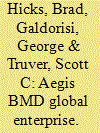

|
|
|
|
|
| Publication |
2012.
|
| Summary/Abstract |
For more than three decades, beginning soon after the end of World War II, the
United States and the Soviet Union faced off against each other. The concept
of "mutual assured destruction"-MAD, the U.S. threat of massive retaliation
to a Soviet first strike-became America's Cold War de facto strategic defense
policy. In March 1983, however, President Ronald Reagan asked whether ballistic
missiles could be destroyed before they reached the United States or its allies,
thus catalyzing efforts for a national ballistic-missile-defense program that would
undermine the need for MAD. That same year, the U.S. N avy commissioned USS
Ticonderoga (CG 47), the first of what is to become a fleet of more than eighty
Aegis warships. In 2012, these trends have converged, and Aegis ballistic-missile
defense (BMD) is an increasingly important component of a robust national
BMD System (BMDS).
|
|
|
|
|
|
|
|
|
|
|
|
|
|
|
|
| 2 |
ID:
059008
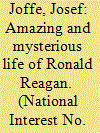

|
|
|
| 3 |
ID:
111183
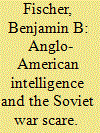

|
|
|
|
|
| Publication |
2012.
|
| Summary/Abstract |
During the Soviet war scare of the 1980s, British intelligence shared vital information from KGB officer Oleg Gordievsky with its American partners. The US intelligence community, however, was suspicious of the message and the messenger, dismissing Soviet 'war talk' as disinformation. Some officials even believed that the British had tweaked their reports to influence US policy. President Ronald Reagan, however, on the advice of Prime Minister Margaret Thatcher, listened to Gordievsky rather than his intelligence advisors. The war scare had a profound influence on Reagan's thinking about nuclear war, Kremlin fears, and Soviet-American relations that led him to seek a new détente with Moscow and the end of the Cold War through diplomacy rather than confrontation. Subsequent events and post-Cold War revelations vindicated Gordievsky. Reagan sought his advice on the eve of his first summit meeting with Mikhail Gorbachev and later expressed his gratitude during a private meeting in the Oval Office.
|
|
|
|
|
|
|
|
|
|
|
|
|
|
|
|
| 4 |
ID:
038675
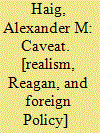

|
|
|
|
|
| Publication |
London, WeidenFeld and Nicolson, 1984.
|
| Description |
367p.Hbk
|
| Standard Number |
0297785176
|
|
|
|
|
|
|
|
|
|
|
|
Copies: C:1/I:0,R:0,Q:0
Circulation
| Accession# | Call# | Current Location | Status | Policy | Location |
| 024336 | 923.273/HAI 024336 | Main | On Shelf | General | |
|
|
|
|
| 5 |
ID:
111975
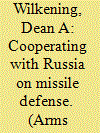

|
|
|
| 6 |
ID:
110295
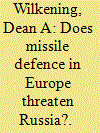

|
|
|
|
|
| Publication |
2012.
|
| Summary/Abstract |
For decades, Russian leaders have expressed concern over American ballistic-missile defence programmes. Early US and Soviet attempts in the 1960s were curtailed by the Anti-Ballistic Missile Treaty of 1972. US proponents of missile defence decried the treaty as an attempt by the Soviet Union to overcome what those proponents believed was America's lead in BMD technology. Russian embrace of the idea that defences upset strategic stability, the central paradigm of the treaty, was suspect because the Soviet Union spent inordinate sums developing strategic air and civil defences, reflecting its conviction that limiting damage from a hypothetical nuclear attack was a worthwhile, if not achievable, goal.
After US President Ronald Reagan's 1983 'Star Wars' speech, Moscow again expressed concern over the US Strategic Defense Initiative, even though such plans were technically fanciful at the time. Within the decade, Russian concerns had subsided, due in part to Russian scientists who noted the infeasibility of many of Reagan's space-based weapons and, more importantly, to more pressing issues raised by the collapse of the Soviet Union. Yet the Strategic Defense Initiative had at least one viable offspring in the form of hit-to-kill interceptors, which were successfully demonstrated in a 1984 test (the Homing Overlay Experiment).
|
|
|
|
|
|
|
|
|
|
|
|
|
|
|
|
| 7 |
ID:
112818


|
|
|
|
|
| Publication |
2012.
|
| Summary/Abstract |
THE YEAR 2011 will be remembered as a period of unprecedented uncertainty in the history of modern Europe. On the one hand, contrary to widespread apocalyptic expectations, the EU did not crumble and the amplitude of the oscillations in the value of the relatively young European currency did stay within tolerable limits. On the other, it is clear that the integrated Europe's worst crash tests are still ahead and that the difficulties confronting the EU are a lot more systemic than circumstantial ...
|
|
|
|
|
|
|
|
|
|
|
|
|
|
|
|
| 8 |
ID:
110316


|
|
|
|
|
| Publication |
2012.
|
| Summary/Abstract |
OF ALL the U.S. presidents since Franklin Roosevelt, none stands taller in history or exercises a greater lingering influence on American politics than Ronald Reagan. Republican politicians invoke his name as example and lodestar, and Democrats have granted him increasing respect as the passions of his presidential years have ebbed with time. Surveys of academics on presidential performance, initially dismissive, now rank him among the best of the White House breed. Even President Obama has extolled his approach to presidential leadership.
|
|
|
|
|
|
|
|
|
|
|
|
|
|
|
|
| 9 |
ID:
116465
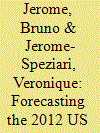

|
|
|
|
|
| Publication |
2012.
|
| Summary/Abstract |
Since 2008, the economic fallout from the subprime mortgage crisis has led to the defeat of a number of incumbents in the world's major democracies. For instance, in the former EU-15, eight countries (including France) have ousted their incumbents in favor of new leaders. The United States is no exception, and the 2012 US presidential election will see Barack Obama running for a second term during difficult economic times. After hitting a high of 10% in October 2009, the nation's unemployment rate decreased to 8.2% in May 2012. Nonetheless, this is still 0.7 percentage point higher than what Ronald Reagan faced in 1984 or what confronted George H.W. Bush in 1992 as they ran for their second terms. Looking at measures of presidential popularity for the month of May since 1980, Barack Obama's approval rating is at 46% in the Gallup polls, which is the third-worst rating after George W. Bush (30% in 2008) and George H.W. Bush (39.4% in 1992). Given Barack Obama's approval rating and the current national unemployment level, must we conclude that Barack Obama is irremediably on the ropes against Mitt Romney in 2012?
|
|
|
|
|
|
|
|
|
|
|
|
|
|
|
|
| 10 |
ID:
095897
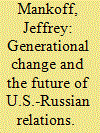

|
|
|
|
|
| Publication |
2010.
|
| Summary/Abstract |
The Cold War has now been over for nearly two decades. In that time, a whole generation has grown up, both in the United States and Russia, with no memory of the conflict that defined world politics for half a century. Not only do today's college students have no memory of even the final stages of the Cold War, many were not even born when the Soviet Union collapsed at the end of 1991. For an ever increasing share of young people in both countries, seminal events from the Cuban missile crisis to Ronald Reagan's stirring call to "tear down this wall" occupy approximately the same place in individual historical consciousness as the assassination of Archduke Franz Ferdinand or the Battle of Waterloo. That observation may seem obvious, but it has profound implications for the future course of relations between the two former Cold War rivals.
|
|
|
|
|
|
|
|
|
|
|
|
|
|
|
|
| 11 |
ID:
100452
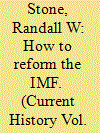

|
|
|
| 12 |
ID:
122084
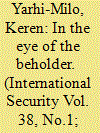

|
|
|
|
|
| Publication |
2013.
|
| Summary/Abstract |
How do policymakers infer the long-term political intentions of their states' adversaries? A new approach to answering this question, the "selective attention thesis," posits that individual perceptual biases and organizational interests and practices influence which types of indicators a state's political leaders and its intelligence community regard as credible signals of an adversary's intentions. Policymakers often base their interpretations on their own theories, expectations, and needs, sometimes ignoring costly signals and paying more attention to information that, though less costly, is more vivid (i.e., personalized and emotionally involving). In contrast, intelligence organizations typically prioritize the collection and analysis of data on the adversary's military inventory. Over time, these organizations develop substantial knowledge on these material indicators that they then use to make predictions about an adversary's intentions. An examination of three cases based on 30,000 archival documents and intelligence reports shows strong support for the selective attention thesis and mixed support for two other approaches in international relations theory aimed at understanding how observers are likely to infer adversaries' political intentions: the behavior thesis and the capabilities thesis. The three cases are assessments by President Jimmy Carter and officials in his administration of Soviet intentions during the collapse of détente; assessments by President Ronald Reagan and administration officials of Soviet intentions during the end of the Cold War; and British assessments of Nazi Germany before World War II.
|
|
|
|
|
|
|
|
|
|
|
|
|
|
|
|
| 13 |
ID:
102329
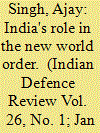

|
|
|
| 14 |
ID:
119456
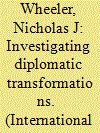

|
|
|
|
|
| Publication |
2013.
|
| Summary/Abstract |
This article investigates the role that diplomacy - especially at the highest levels - can play in transforming adversarial relationships. Building on Martin Wight's exploration of these issues, in particular the question of how two adversaries can convince each other that they are serious negotiating partners, the article contends that achieving a significant de-escalation of a conflict depends upon the growth of trust.
In contrast to Wight's limited conception of what diplomacy could achieve in terms of ending conflicts, the argument made here is that particular types of communicative encounters between diplomats, and especially leaders, can build a level of trust at the interpersonal level which can lead policy-makers to make conciliatory frame-breaking moves. To make good on this claim, the article employs a case-study of the summitry between US president Ronald Reagan and his Soviet counterpart, Mikhail Gorbachev.
The key contention here is that the face-to-face encounters between Reagan and Gorbachev promoted a level of trust between them that made possible the fundamental de-escalation of the Cold War that took place in the second half of the 1980s. Rival explanations focusing on nuclear weapons and Soviet economic decline are analysed, but while these were enabling conditions in the transformation of relations, the article argues that it is necessary to recognize the critical role that interpersonal trust between US and Soviet leaders played in achieving this diplomatic transformation.
|
|
|
|
|
|
|
|
|
|
|
|
|
|
|
|
| 15 |
ID:
188629
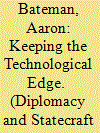

|
|
|
|
|
| Summary/Abstract |
In March 1983, President Ronald Reagan established the Strategic Defence Initiative [SDI], a research effort to develop the technologies for land- and space-based missile defence. This programme quickly unleashed anxieties about an arms race in space. Superpower military space activities were of significant concern to Britain because they had direct bearing on two key areas of its national security: space-based intelligence collection and the credibility of its nuclear deterrent. This analysis argues that the uses of space for military and intelligence purposes was an essential, though often invisible, aspect of the Anglo-American relationship during the Cold War. Despite the opposition of her senior advisors to SDI, British Prime Minister Margaret Thatcher maintained that the programme was necessary to stay ahead of the Soviet Union in an intensifying high-technology competition. Rather than opposing the expanded militarisation of space, she believed it required careful management to further British national security interests.
|
|
|
|
|
|
|
|
|
|
|
|
|
|
|
|
| 16 |
ID:
137593
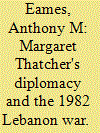

|
|
|
|
|
| Summary/Abstract |
The year 1982 emerged as pivotal in the Atlantic Alliance and the relationship between President Ronald Reagan and Prime Minister Margaret Thatcher. On 6 June 1982, Israeli Defense Forces breached the Lebanese border in a maneuvre to eradicate the Palestinian Liberation Organization. The campaign opened a violent episode in the decades-old Arab-Israeli conflict. Almost immediately the British Foreign and Commonwealth Office recognized the challenge to the international community. The crisis in the Middle East occurred during a period of substantial turnover in the foreign policy communities of both London and Washington. Subsequent improved bilateral relations between the United States and the United Kingdom paved the way for greater cooperation in international diplomacy between respective national executives.
|
|
|
|
|
|
|
|
|
|
|
|
|
|
|
|
| 17 |
ID:
119897
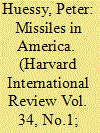

|
|
|
|
|
| Publication |
2012.
|
| Summary/Abstract |
President Ronald Reagan proposed in March 1983 that the US scientific community develop the ability to shoot down ballistic missiles armed with nuclear warheads. He hoped to shift the international security environment away from a balance of terror, which was then commonly referred to as mutual assured destruction, to a more reliable deterrent strategy.
|
|
|
|
|
|
|
|
|
|
|
|
|
|
|
|
| 18 |
ID:
093808
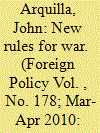

|
|
|
|
|
| Publication |
2010.
|
| Summary/Abstract |
Every day, the U.S. military spends $1.75 billion, much of it on big guns,and big battalions that are not only not needed to win the wars of the present, but are sure to be the wrong approach to waging the wars of the future.
|
|
|
|
|
|
|
|
|
|
|
|
|
|
|
|
| 19 |
ID:
115778
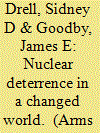

|
|
|
| 20 |
ID:
102030
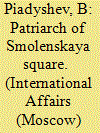

|
|
|
|
|
| Publication |
2010.
|
| Summary/Abstract |
YURI DUBININ, AMBASSADOR Extraordinary and Plenipotentiary, who occupies a special and elite place in the cohort of outstanding Russian diplomats, is celebrating his 80th birthday on Smolenskaya Square in Moscow, in the imposing building that houses the Russian Ministry of Foreign Affairs.
|
|
|
|
|
|
|
|
|
|
|
|
|
|
|
|
|
|
|
|
|